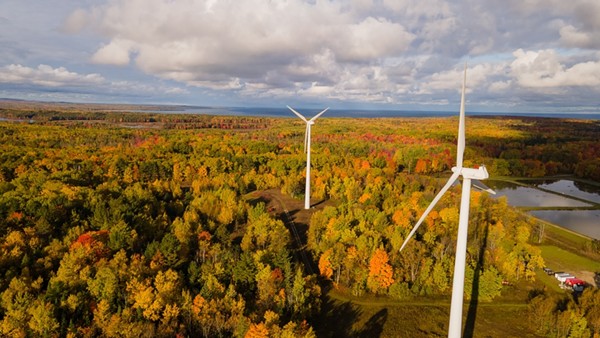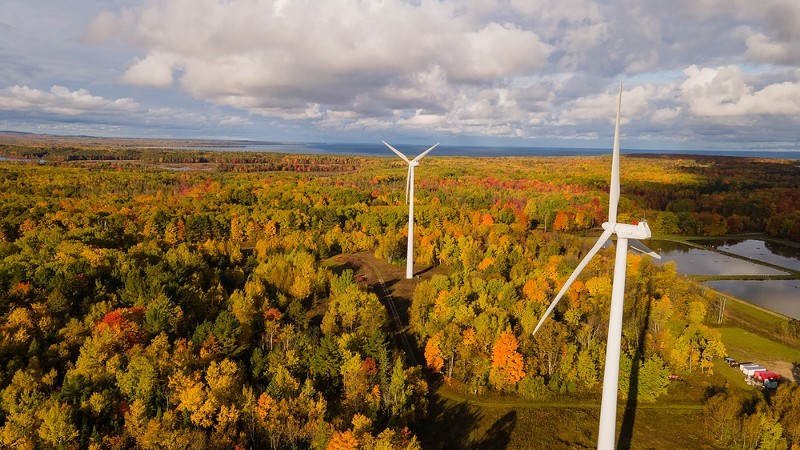Michigan has emerged as a national leader in the clean energy sector following a series of ambitious state laws enacted by Gov. Gretchen Whitmer, according to a report released Monday.
With investments from the federal Inflation Reduction Act (IRA), Whitmer signed a package of bills in November 2023 aimed at creating tens of thousands of jobs, reducing energy costs for families, expanding access to alternative energy sources, setting new carbon emission standards, and requiring utility companies to become more energy efficient.
Michigan now has more clean energy projects than any other state — 62 — creating 21,748 jobs and receiving more than $26.6 billion in new investments, according to a report released Monday by 5 Lakes Energy, a firm specializing in clean energy policy, sustainability, and environmental consulting.
According to the report, the state ranks among the top five in the U.S. for new clean energy projects and job creation.
“Last year, Governor Whitmer and the state Legislature secured a clean and prosperous economic future for Michigan. And today, we can see just how investing in the state’s clean energy economy and local businesses will benefit all Michiganders,” Courtney Bourgoin, senior policy and advocacy manager for Evergreen Action Midwest, said in a statement. “Michigan’s new clean energy policies position the state to fully leverage the federal funding available from the IRA to develop a thriving clean energy workforce and save the state billions of dollars in energy and public health costs. Michigan’s clean energy future is bright — and it’s already started.”
Beyond reducing emissions, the projects are also driving down energy costs for residents, according to the report. By 2030, Michigan families are expected to see an average reduction of $297 per year in their energy bills, a figure that could rise to $713 per year by 2040. This reduction is a direct result of the state’s shift toward cleaner, more efficient energy sources, the report states.
Michigan is projected to receive a total of $15.6 billion in IRA funding by 2030, and the figure is expected to nearly double to $30.7 billion by 2040. These investments will spur further economic development across the state, the report states.
The report also forecasts a reduction in greenhouse gas emissions from the electric power sector by at least 65% by 2030 and 88% by 2040. These reductions are positioning Michigan as a leader in the fight against climate change, the report states.
The report also underscores the public health benefits of the state’s clean energy policies. By reducing pollution, Michigan is expected to save $7.3 billion in avoided public health costs by 2030, with savings growing to $27.8 billion by 2040. These savings reflect fewer deaths, hospitalizations, and lost school and work days due to cleaner air and healthier communities.
“This report shows the strength of Michigan’s clean energy industry and its importance to the state’s economy,” Dr. Laura Sherman, president of the Michigan Energy Innovation Business Council, said. “It is clear that the clean energy industry has been and expects to continue to hire new workers. Importantly, these are high-paying jobs at or above prevailing wage. Thanks in part to federal and state policies, companies across the clean energy industry are planning to expand operations and investments across Michigan.”
In metro Detroit, the projects are expected to spur more than 24,000 new jobs by 2030 and 40,240 by 2040.
Pollution-spewing factories are disproportionately operating in predominantly Black areas of Detroit.
Last month, environmental activists reached a “groundbreaking settlement” with Michigan regulators following a civil rights complaint over the licensing of hazardous waste facilities in predominantly Black, brown, and lower-income neighborhoods. It marks the first time that the Michigan Department of Environment, Great Lakes, and Energy (EGLE) will be required to use a federal mapping tool that identifies areas facing greater environmental risks and challenges. The tool, the Environmental Protection Agency’s EJScreen, helps policymakers direct resources and regulations to areas most in need.
“Thanks to Michigan’s bold new clean energy laws and nation-leading investments, we’re not only slashing household energy costs but unlocking billions in federal investment through the Inflation Reduction Act and the benefits are undeniable,” Bob Allison, deputy director for the Michigan League of Conservation Voters, said. “This is about more than just getting Michigan’s fair share of funds — it’s about creating good-paying union jobs and boosting our local economies across Michigan. We are showing the nation that investing in clean energy isn’t just the right thing to do for our environment — it’s the smart choice for our economic future.”
Overall, the report paints a promising picture of Michigan’s clean energy future, showing how federal and state policies are working together to drive economic growth, reduce costs, and create a healthier environment for all Michiganders.
“With nation-leading clean energy policies, Michigan is now at the forefront of the energy transition — attracting federal investment, creating jobs, reducing energy costs, and cutting air pollution across the state,” Douglas Jester, 5 Lakes Energy managing partner, said. “This report highlights how these benefits are reaching every region, while significantly advancing the state’s climate goals.”


